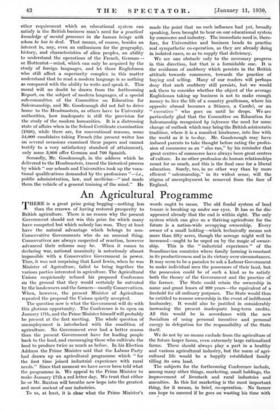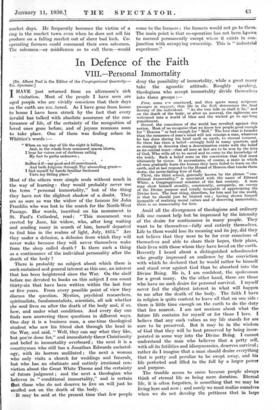An Agricultur
al. Programme THERE is a great prize going begging—nothing less than the renown of having restored prosperity to British agriculture. There is no reason why the present Government should not win this prize for which many have competed but which nobody has won. They at least have the natural advantage which belongs to non- Conservative Governments who do an unusual thing. Conservatives are always suspected of reaction, however advanced their reforms may be. When it comes to declaring war, national unanimity is notoriously almost impossible with a Conservative Government in power. Thus, it was not surprising that Lord Irwin, when he was Minister of Agriculture, failed to bring together the various parties interested in agriculture. The Agricultural Unions suspiciously refused his proposed Conference on the ground that they would certainly be outvoted by the landowners and the farmers—mostly Conservatives. When, however, the present Minister of Agriculture repeated the proposal the Unions quietly accepted.
The question now is what the Government will do with this glorious opportunity. The Conference is to open on January 17th, and the Prime Minister himself will probably be present at the first meeting. The whole question of unemployment is interlocked with the condition of agriculture. No Government ever had a better reason than the present Government have for leading people back to the land, and encouraging those who cultivate the land to produce twice as much as before. In his Election Address the Prime Minister said that the Labour Party had drawn up an agricultural programme which " for the first time joined industrial experience with rural needs." Since that moment we have never been told what the programme is. We appeal to the Prime Minister to make January 17th a red letter day. We trust that either he or Mr. Buxton will breathe new hope into the greatest and most ancient of our industries.
s To us, at least, it is clear what the Prime Minister's words ought to mean. The old feudal system of land tenure is breaking up under our eyes. It has so far dis: appeared already that the end is within sight. The only system which can give us a thriving agriculture for the future is a nation-wide occupying ownership. Every owner of a small holding—which technically means not more than fifty acres, though the acreage might well be increased—ought to be urged on by the magic of owner- ship. This is the " industrial experience " of the Scandinavian countries where family farming is constant in its productiveness and in its victory over circumstances. It may seem to be a paradox to ask a Labour Government to make individual men the possessors of their land, but the possession could be of such a kind as to satisfy both the theory of the Government and the practice of the farmer. The State could retain the ownership in name and grant leases of 999 years—the equivalent of a freehold for all ordinary purposes. The State would thus be entitled to resume ownership ih the event of indifferent husbandry. It would also be justified in considerably increasing the present inadequate long-term credits. All this would be in accordance with the new Socialism of using personal incentive and personal energy in delegation for the responsibility of the State itself.
We do not by no means exclude from the agriculture of the future larger farms, even extremely large rationalized farms. These should always play a part in a healthy and various agricultural industry, but the norm of agri- cultural life would be a happily established family tilling its own land.
The subjects for the forthcoming Conference include, among many other things, marketing, small holdings, the improvement of livestock and rural industries and amenities. In this list marketing is 'the most important thing, for it means, in brief, co-operation. No farmer can hope to succeed if he goes on wasting his time with market days. He frequently becomes the victim of a ring in the market town even when he does not sell his produce on a falling market out of sheer bad luck. Co-: operating farmers could command their own salesmen. The salesmen—or middlemen so to call them—would come to the farmers ; the farmers would not go to them. The main point is that co-operation has not been kpown to succeed permanently except where it exists in con-, junction with occupying ownership. This is " industrial experience."







































 Previous page
Previous page